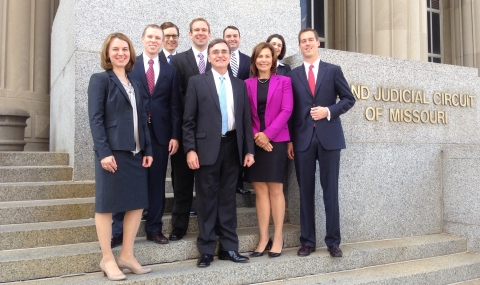Victory in FMLA and MHRA Suit

An eight-member jury in the U.S. District Court for the Eastern District of Missouri unanimously entered a defense verdict in favor of Lewis Rice client Shade Tree Services Company, and against Bruce Anderson, who had sued claiming employment discrimination and retaliation.
Mr. Anderson claimed that Shade Tree demoted and then fired him because of his alleged disability, namely, a past addiction to prescription pain medication, and because he took medical leave to obtain treatment for this disability. His claims were brought under the federal Family and Medical Leave Act (FMLA) and the Missouri Human Rights Act (MHRA). The MHRA claim raised novel issues of discrimination law regarding whether an individual who was "currently addicted" to a controlled substance could nevertheless prevail if that substance was a medication prescribed by a physician. Judge E. Richard Webber agreed with Shade Tree's statutory interpretation and allowed all relevant evidence to be admitted. The jury reached a verdict in favor of Lewis Rice's client, despite the fact that the MHRA carries a lenient standard of proof in which an employee can recover even if his disability was merely a contributing factor (as opposed to a motivating or determinative factor) in his demotion or discharge.
Lewis Rice Upholds Missouri Franchise Act in Alcohol Distribution Case

The Case
Lewis Rice represented Major Brands, a multi-generation Missouri family-owned wine, spirits, and beer distributor, in a suit against Diageo, the world's largest liquor supplier, which arose after Diageo terminated its decades-long relationship with Major Brands and moved approximately $100 million in business to a much larger multi-state distributor that was also Major Brands' chief competitor, Texas-based Glazer's. The litigation centered on the interpretation and applicability of the Missouri Franchise Act, which prohibits the termination of liquor distribution relationships, unless the supplier can first establish statutorily defined good cause.
The Stakes
For Major Brands, the stakes could hardly have been higher. In a 24-hour period, Major Brands received notices of termination from Diageo and other suppliers, which would mean that Major Brands stood to lose close to half of its revenue in the coming months. The liquor distribution industry likewise had much riding on this case. Missouri is one of approximately 17 states with liquor franchise laws, which are generally disfavored by large suppliers. This case was viewed by those in the industry as a testing ground for suppliers' future challenges to franchise laws through distributor terminations.
The Lewis Rice Team
The trial team from Lewis Rice was led by Richard B. Walsh, Jr., Chairman of the Litigation Department. His creative, out-of-the-box approach was critical to achieving the mid-trial settlement and assisting the client with navigating the business and regulatory challenges posed by this case. Rick Walsh assembled a small trial team of experienced Lewis Rice members and associates, giving each core team member significant responsibility and a level of autonomy that allowed the team to effectively pursue an aggressive discovery and trial strategy. In addition to Rick, the core team included Evan Z. Reid, Bridget G. Hoy, Oliver H. Thomas, R. Taylor Matthews, III, Derick C. Albers, Sarah A. Milunski, and Edward T. Pivin. About his team, Rick said: "The depth of talent that we have at Lewis Rice, at all levels, allows us to staff cases leaner, know the facts better, and adjust quicker. Those advantages become particularly apparent in cases like this, where there is a large volume of documents, witnesses, and briefing, accompanied by an aggressive schedule that creates extreme time pressure."
The Resolution
In the second week of trial, Major Brands reached a confidential settlement with Diageo and Glazer's. In announcing the settlement, the following statements were issued:
"The parties in the Missouri trial of Major Brands against Diageo and Glazer's have settled the case for a substantial payment made to Major Brands. Diageo issued the following statement: Diageo is pleased to amicably resolve this regrettable dispute. Diageo continues to distribute our beer and Smirnoff Ice lines with Major Brands, recognizing it as a well-run, family-owned business, which in the words of the late Todd Epsten, 'uses its business to build the community.' We look forward to growing that business in Missouri with Major Brands. Major Brands is thankful to the Judge, the Missouri judicial system, and the St. Louis citizens who sat on the Jury, and appreciates Diageo's kind words about Todd. The company is happy to put this matter in the rear-view mirror and remains committed to providing our retailers and suppliers with outstanding service and performance."
Toxic Tort Team Secures Dismissal of DuPont in Asbestos Case for Lack of General Personal Jurisdiction in Missouri
Lewis Rice attorneys Jeremy P. Brummond, Edward T. Pivin, Corey M. Schaecher, and David A. Weder secured an order dismissing E. I. du Pont de Nemours and Company ("DuPont") for lack of general jurisdiction in an asbestos case pending in the 22nd Circuit Court for the City of St. Louis, Missouri, despite DuPont's ongoing business contact with the state. (Smith v. Union Carbide Corp., et al., Cause No. 1422-CC000457.) The decision is a significant development for personal jurisdiction jurisprudence in Missouri, following the U.S. Supreme Court's decision in Daimler AG v. Bauman, 134 S. Ct. 746 (2014) that was issued in January 2014.
Daimler AG v. Bauman
In Daimler AG v. Bauman, the U.S. Supreme Court refocused the doctrine of general jurisdiction to its intended scope and held that Daimler AG, a German car manufacturer with "multiple California-based facilities," was not subject to general personal jurisdiction in that state because California was neither its state of incorporation nor principal place of business. (134 S. Ct. 746, 752 (2014).) The Daimler court held that there were two "paradigm bases" on which courts may rely on exercising general, all-purpose personal jurisdiction over a foreign corporation: (1) state of incorporation and (2) principal place of business. Exceptional cases aside, it is only in these forums that a corporation is truly "at home" and constitutionally subject to general personal jurisdiction.
The exemplar "exceptional case" cited by the Daimler court presented a scenario where a corporation temporarily relocated its headquarters to a new jurisdiction and did not focus on the quantity or quality of the contacts as a potential "exception." (See Perkins v. Benguet Consolidated Mining, Co., 342 U.S. 437 (1952).) In fact, the Daimler court went further to explain that "the exercise of general jurisdiction in every State in which a corporation engages in a substantial, continuous, and systematic course of business" would be "unacceptably grasping." Id. at 761.
Smith v. DuPont, et al.
In Smith v. DuPont, Cause No. 1422-CC000457 (22nd Judicial Circuit, St. Louis City, State of Missouri), DuPont was named as one of approximately 70 defendants in a claim filed by Oklahoma resident David F. Smith in the City of St. Louis on February 26, 2014. Plaintiff pursued premises liability claims against DuPont, related to his work and alleged exposure to asbestos at a DuPont facility in Oklahoma and admitted that his DuPont-related claims did not arise out of any purported contacts with Missouri (eliminating any grounds for the exercise of specific jurisdiction under Missouri's long-arm statute). In a well-reasoned order following Daimler, the Court (Hon. Robert A. Dierker) held that because DuPont was neither incorporated nor headquartered in Missouri, the court could not exercise personal jurisdiction over DuPont in Missouri.
Judge Dierker also agreed that the Missouri contacts of DuPont's wholly-owned subsidiary, Solae, Inc. – which is headquartered in St. Louis – were insufficient to infer personal jurisdiction over the parent company DuPont. Judge Dierker also disagreed with Plaintiff's arguments and held that the mere facts that DuPont is registered to do business and maintains a registered agent in for service of process in Missouri did not mean that DuPont consented to the exercise of general jurisdiction of Missouri Courts.
A copy of the order can be found by clicking the link under "Resources" below.
Lewis Rice has many attorneys with significant experience in toxic tort cases, including cases like the Smith case involving alleged asbestos exposure. For more information, please contact a lawyer from Lewis Rice's Toxic Tort and Environmental Law Practice Group.
Resources
Eighth Circuit Affirms Victory for Omega Flex, Inc. in Products Liability Action
A three-judge panel of the U.S. Court of Appeals for the Eighth Circuit unanimously affirmed a defense verdict in favor of Lewis Rice client Omega Flex, Inc. in a case involving allegations by an insurer that Omega Flex's gas piping product was defective and caused a house fire following an indirect lightning strike.
In 2011, American Automobile Insurance Company (AAIC) sued Omega Flex in the U.S. District Court for the Eastern District of Missouri on theories of negligence, products liability, and breach of warranty. AAIC alleged that corrugated stainless steel tubing (CSST) manufactured by Omega Flex for use in residential gas transportation systems was defectively designed and was too thin to withstand energy from an indirect lightning strike that occurred near AAIC's insured's property and resulted in a house fire.
Prior to trial, the District Court granted Omega Flex's motion to exclude certain opinions proffered by AAIC's expert relating to CSST's design, and entered summary judgment in favor of Omega Flex on AAIC's claims for breach of warranty and failure to warn. Following a four-day trial, a jury returned a verdict in favor of Omega Flex, finding that Omega Flex did not fail to use ordinary care in designing the CSST, or otherwise sell the CSST in an unreasonably dangerous or defective condition. Lewis Rice attorneys Thomas P. Berra, Jr., Neal F. Perryman, Oliver H. Thomas, and Edward T. Pivin were part of a trial team led by William J. Conroy and Lynne O'Brien Ingram of the Pennsylvania-based law firm of Campbell Campbell Edwards & Conroy, P.C.
Following the District Court's denial of its motion for a new trial, AAIC filed its appeal with the Eighth Circuit, arguing that the District Court's exclusion of its expert's opinions on design, coupled with its admission of testimony from Omega Flex's expert, constituted a clear and prejudicial abuse of discretion. The Eighth Circuit disagreed, and affirmed the District Court's rulings under Daubert v. Merrell Dow Pharm., Inc., 509 U.S. 579 (1993). See Am. Auto. Ins. Co. v. Omega Flex, Inc., No. 14-1783, 2015 WL 1653209 (8th Cir. Apr. 15, 2015). Lewis Rice attorney Neal Perryman successfully argued the matter before the Eighth Circuit.










